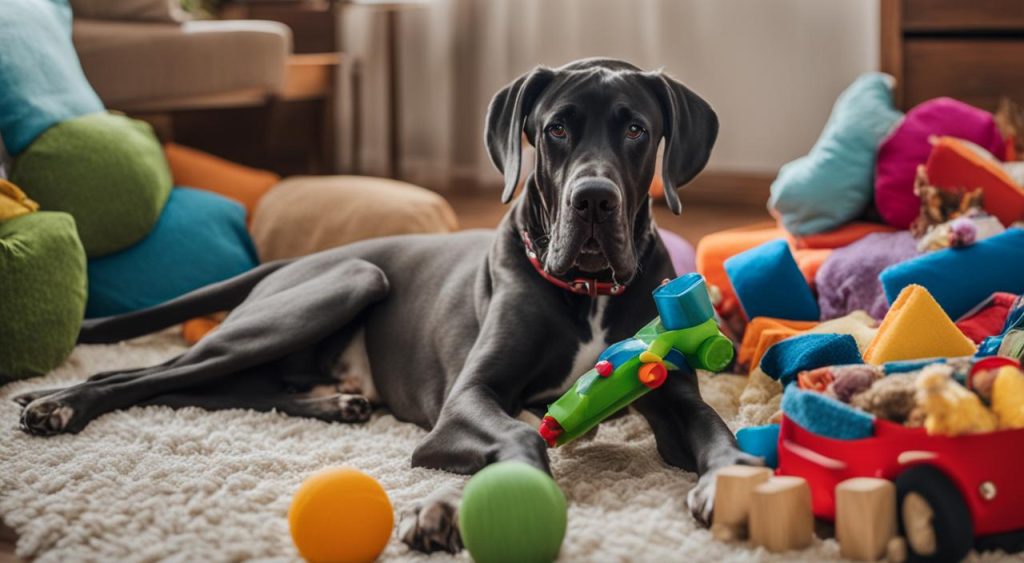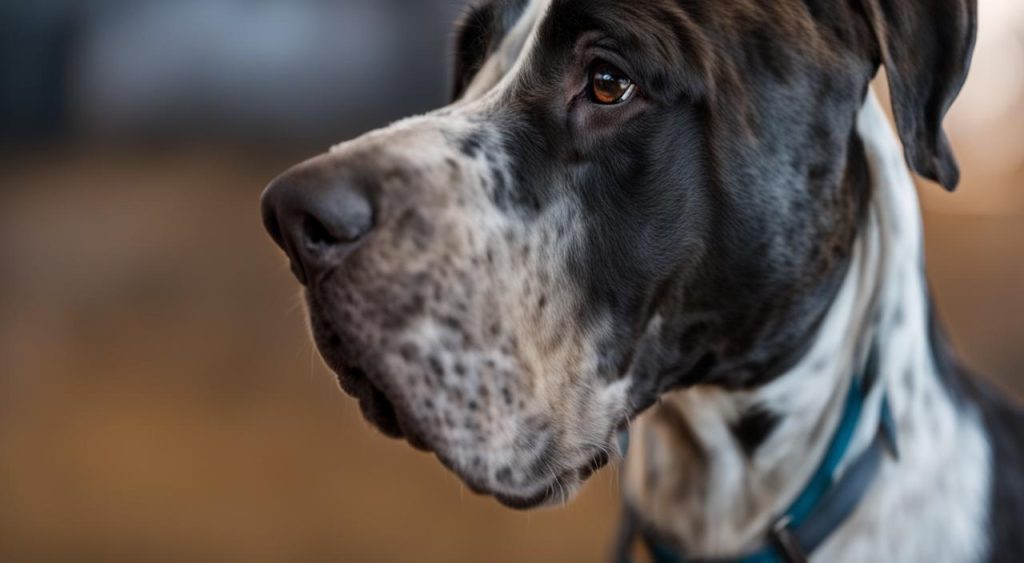In this article, we will explore the common health issues associated with Great Danes, potential problems that arise from owning these majestic dogs, and the breed-specific health concerns that Great Dane owners should be aware of. While Great Danes are beloved for their gentle nature and towering presence, it’s important to understand the health challenges they may face.
Great Danes have a relatively short life span compared to smaller dogs, with an average lifespan of 8 to 10 years. Unfortunately, they are prone to several health conditions that can significantly impact their well-being. Some of the common genetic health problems in Great Danes include bloat, cardiomyopathy, joint and bone diseases, and thyroid problems.
Bloat, or gastric dilatation volvulus, is a dangerous and often fatal condition where the stomach twists, cutting off blood supply. Cardiomyopathy is a disease that affects the heart muscle and can lead to enlargement of the heart. Great Danes are also commonly affected by joint and bone diseases like hip dysplasia and osteoarthritis. Additionally, they are prone to thyroid problems, including autoimmune thyroiditis. Behavioral problems can also arise in Great Danes, making it essential for owners to be aware of both their physical and mental well-being.
To improve your Great Dane’s lifespan and overall quality of life, responsible breeding is crucial. Choose a breeder who has tested their dogs for hip dysplasia and other genetic issues. Providing a healthy diet and maintaining a proper weight are essential for preventing excessive growth and musculoskeletal diseases. Regular vet check-ups and vaccinations should be part of your preventative care routine. Joint supplements, such as glucosamine and chondroitin, can support the joint health of Great Danes and alleviate symptoms of hip dysplasia.
Knowing the common health problems in Great Danes is essential for their well-being. Bloat, canine dilated cardiomyopathy, joint and bone diseases, thyroid problems, tricuspid valve disease, osteosarcoma, and Addison’s Disease are some of the conditions that may affect Great Danes. Understanding these health concerns and seeking appropriate veterinary care can help ensure your Great Dane lives a healthy and happy life.
Key Takeaways:
- Great Danes are prone to several common health issues, including bloat, cardiomyopathy, joint and bone diseases, and thyroid problems.
- Responsible breeding plays a vital role in reducing the risk of genetic health problems in Great Danes.
- A healthy diet and maintaining a proper weight are crucial for the overall health of Great Danes.
- Regular vet check-ups and vaccinations are essential for preventative care.
- Joint supplements can support the joint health of Great Danes and alleviate symptoms of hip dysplasia.
Tips to Improve Your Great Dane’s Life Span
Responsible breeding plays a crucial role in minimizing the risk of genetic health problems in Great Danes. When choosing a breeder, make sure they have conducted tests for hip dysplasia and other potential genetic issues. This ensures that you bring home a healthy and genetically sound Great Dane.
A proper and healthy diet is essential for your Great Dane’s overall well-being, especially during their puppyhood. Providing a balanced diet helps prevent excessive growth and musculoskeletal diseases. It’s important to feed your Great Dane the right amount of food and maintain a healthy weight to reduce the risk of obesity-related health problems.
Preventative care is key in improving your Great Dane’s life span. Schedule regular vet check-ups and ensure that vaccinations are up to date. This allows your vet to detect and manage any potential health conditions early, increasing the chances of successful treatment.
Additionally, joint supplements can play a vital role in supporting the joint health of Great Danes and reducing the symptoms of hip dysplasia. Consider incorporating supplements like glucosamine and chondroitin into their daily routine to improve joint mobility and alleviate discomfort caused by joint problems.
By prioritizing responsible breeding, providing a healthy diet, practicing preventative care, and considering joint supplements, you can enhance the quality and length of your Great Dane’s life.
Common Health Problems in Great Danes
When it comes to Great Danes, it’s important for owners to be aware of the common health problems that can affect this majestic breed. Great Danes are prone to several health conditions that require attention and proactive management.
Bloat, also known as gastric dilatation volvulus, is a life-threatening condition that Great Danes are particularly susceptible to. This occurs when the stomach twists, cutting off blood supply and leading to severe complications. Another common health issue in Great Danes is canine dilated cardiomyopathy, a heart disease that impacts the heart’s ability to effectively pump blood.
Due to their large size, Great Danes are also prone to joint and bone diseases such as hip dysplasia and osteoarthritis. These conditions can cause discomfort and mobility issues if left untreated. Furthermore, thyroid problems, including autoimmune thyroiditis, are a concern for Great Danes and may require medication for management.
Additionally, Great Danes may develop tricuspid valve disease, a condition that affects the proper functioning of the heart valve. Osteosarcoma, a type of bone cancer, is more frequently observed in Great Danes, calling for vigilance and early detection. Lastly, Addison’s Disease, which affects the adrenal gland’s corticosteroid secretion, is another health challenge that can arise in Great Danes.
As a responsible Great Dane owner, it is important to stay informed about these common health problems and work closely with a veterinarian to ensure the well-being of your beloved pet. Prompt veterinary care, regular check-ups, and appropriate management strategies can help mitigate the impact of these conditions and enhance your Great Dane’s quality of life.





